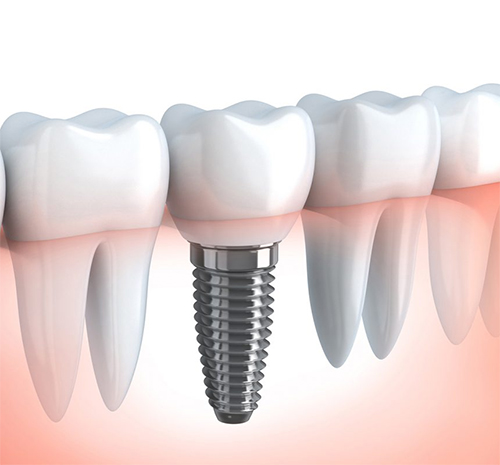

Many people are quite rightly concerned about the cost of replacing missing teeth and specifically the cost of dental implants. Implants are often the preferred choice for many reasons (Please see our previous blog post) and so this is often the focus of attention. In this blog post we will address the key concerns about the cost of dental implants, look at what a few other people say about the costs and consider what your options could be to keep costs as low as possible.
The first thing to consider is the constituent parts of the dental implant. If we understand how the cost is made up of each individual component of the dental implant we can begin to work out which ones cost the most and which ones we can look to replace to keep costs down.
The cost of a dental implant is made up of the following components:
Dental implants are custom-made dental devices which are made exclusively for your own use. Each bespoke implant will only ever fit one individual person and it is this time and effort in customising this precision made piece of engineering to your own requirements that adds to the cost.
It is possible to cut down on some of these costs, for example you could have a dental implant placed by someone with not so much experience. Their time would then be cheaper. You can also request cheaper dental implant components however, you may find that these cheaper components are not made to the same tolerances as more expensive implants and could be more prone to failure.
Using a cheap dental laboratory is also a possibility. However, cheaper dental laboratories may not use such good quality components in the manufacture of their restorations and may spend less time. This could result in a lower quality product which doesn’t look as good.
This is a difficult question to answer, it depends upon how many you need and exactly what your own situation is, however a typical dental implant works out normally from £2500.
With the advent of modern information technology it has become easier to research different ways to replace missing teeth. Unfortunately many patients have decided that the solution to the problem of reducing costs is to go overseas the dental implants. The National Health Service has created their NHS choices website which has plenty of information about travelling overseas for dental implants, they quote:
“You may not get all the information or reassurance you would normally get from your dentist at home” – Damien Walmsley, professor of restorative dentistry at the University of Birmingham
The General Dental Council also have excellent information about the cost of dental implants and travelling abroad, here’s a list of the recommendations they make with our own comments.
One of the most important aspects with any type of invasive dental treatment is the amount of trust you have in your surgeon. Not only must they be a nice person and you should like them but you need to be sure they have adequate qualifications. Here in the UK the General Dental Council have a specialist register for dentists that have undergone a Masters level degree and joined the specialist register for periodontics which will qualify them to place dental implants. For this reason in our opinion the best person who should place your implant is a periodontist (gum specialist) with experience. Before having dental implants in the UK we recommend that you check the register to find a local dentist, preferably working with a periodontist… If you’re going abroad do they offer the same high level of trust and assurance? Periodontists do gum surgery and understand gums very well. They will get the best gum contour around your implant and this will get you the best aesthetics result so that the gum around your implant looks good and as a result make your implant look very natural.
It is highly recommended that you ask the dental practice that you’re going to visit a list of patient reviews and testimonials. These reviews would give you an idea as to the type of treatments the practice is able to carry out an what patients may think about such treatment. The dental practice website should have these reviews or you may perhaps want to look at their patient testimonials on their YouTube channel. Here is ours.
In order to practice dentistry in the United Kingdom every dentist, including those that place implants must be registered with the General Dental Council. Each practice must also conform to the guidelines and protocols as laid out by the Care Quality Commission (CQC), this ensures your standard of care meets defined standards, especially with cross infection control and your ability to feedback to the dentist any concerns. If you’re travelling overseas to have dental implants does your dentist have to register with a professional body? Who is going to hold them accountable for the treatment? And most importantly, if they are registered with a professional body is that registration compulsory?
As we have already mentioned a dental implant is a bespoke dental device and as such may not be perfect the first time. The dental implant itself is manufactured in a precision way and will not be seen however, the dental restoration which goes on top (crown, bridge or denture) will be bespoke made by a dental technician. Precise matching with the shape, contour and colour of the surrounding teeth and/or opposing teeth is vital in order to ensure that the completed restoration functions, performs and looks as good as possible.
With the greatest intention in the world this does not always go right first time. You may be required to visit the dental practice a couple of times for minor modifications in order to get the restoration looking perfect. If this happens and you have travelled overseas you may incur considerable additional costs, what happens to these?
Part of compliance with the CQC, which is compulsory in the UK, is to have a robust complaints procedure. This ensures that you have the means to complain to your dentist if things don’t go right, they then have an obligation to follow-up this complaint. The CQC audit these complaints in the UK and ensure that the procedures are strictly adhered to. If you travel abroad for your dental implants will you get the same level of compliance? Who is going to monitor any complaints? Who will ensure that any complaints are followed up? Here is our full audit with the CQC.


BRACES


BONDING


Dental Health Plan
We are accepting new patients, book an introduction call today
Book An Introduction Call
Our Gromits have become quite the local celebrities here at Evolve 🐾💛
So many of you pop into our patient lounge just to see the collection, and we love how much joy they bring to patients of all ages.
At the moment, two of our Gromits seem to have wandered off on an adventure! We’re hoping they simply need a little help finding their way home.
If you happen to spot them locally or see anything that looks like part of our collection being sold, we’d really appreciate you letting us know. You can message us privately or call the practice.
They’re part of what makes Evolve feel like Evolve — and we’d love to have the whole family back together again.
Thank you for always looking out for us 💛
#Portishead
#PortisheadLife
#PortisheadBusiness
#NorthSomerset
#BristolAndBeyond
#ShopLocalSomerset
#supportlocalbusinesses❤️ #Gromit
#GromitSpotting
#WallaceAndGromit
#Aardman
#GromitUnleashed
#gromitfans #CommunityMatters
#KeepingItLocal
#SpreadTheWord
#HelpUsFindThem


😴 Can snoring affect your oral health?
In our latest Two Thirty video, Maggie answers a question many people don’t think to ask — can snoring impact your teeth and gums?
The short answer is yes, it can.
Snoring is often linked to breathing through your mouth at night, which can cause a dry mouth. Saliva plays an important role in protecting your teeth, so when your mouth is dry, you may be more prone to tooth decay and bad breath.
If you snore and have noticed dryness, increased decay or concerns about your breath, it’s worth mentioning at your next appointment.
Our reception team at Evolve Dentistry in Portishead will be happy to arrange a consultation if you’d like advice.


⏰ Smile hack: When you brush matters
Did you know it’s not just how long you brush — but when you brush — that makes a difference? Maggie shares an important smile hack about timing your toothbrushing properly.
Brushing straight after eating — especially after acidic foods or drinks like fruit, juice or coffee — can actually do more harm than good. Your enamel is slightly softened, and brushing immediately can cause wear.
Maggie explains the best time to brush and why waiting can help protect your teeth long term.
It’s a small change that can make a big difference to your oral health.


How do braces actually work? 🤔
In the latest video from our Two Thirty series, Lisa explains exactly how braces move teeth — and why treatment takes time.
If you’ve ever wondered how gentle pressure can gradually straighten your smile, or what’s happening behind the scenes during orthodontic treatment, this short video breaks it down in a clear and easy-to-understand way.
Whether you’re considering braces for yourself or your child, understanding the process can make the journey feel much more reassuring.
Watch the full video now and, if you have questions about braces, our reception team will be happy to help you book a consultation at Evolve Dentistry in Portishead.


Have you got an old filling on a front tooth that’s starting to discolour?
Andrea recently visited us to have a stained filling replaced by Richard — and she’s absolutely thrilled with the result.
In her video, she talks about how the old filling had become noticeable over time and how much fresher and more natural her smile looks now.
Sometimes it’s the small changes that make the biggest difference to your confidence.
If you’re unhappy with an old filling, contact our reception team to book a consultation and explore your options.


Thinking about improving your smile but not sure what SmileFast actually involves?
Richard Ford has recorded a short video explaining how the SmileFast process works and the benefits of treatment.
From digital smile design through to the final result, SmileFast offers a minimally invasive way to enhance chipped, worn or uneven teeth — with predictable, natural-looking outcomes.
If you’ve been curious about composite bonding or want to understand your options, this is a great place to start.
Watch the full video on our YouTube channel and contact our reception team if you’d like to book a consultation.





